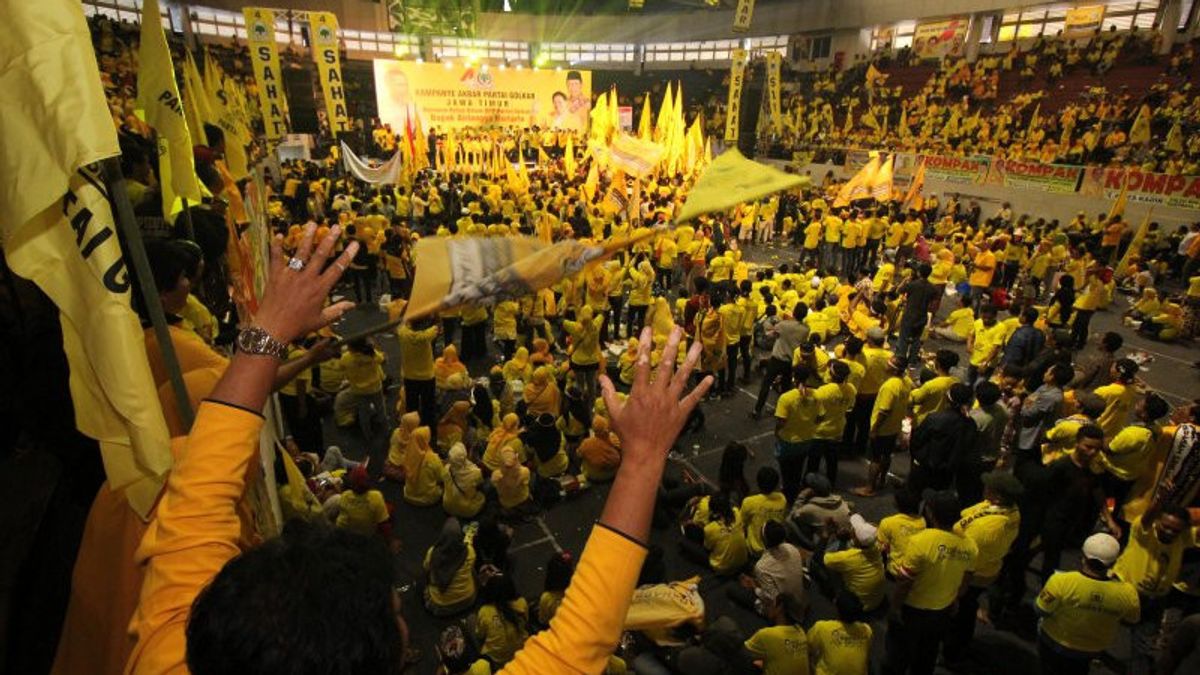JAKARTA - The results of the Center for Strategic and International Studies (CSIS) survey place the Golkar Party as the most popular party among young voters. Responding to this, the Golkar Party DPP was not surprised. The reason is, Golkar is said to have long provided a place for young people through party programs that directly target millennials.
"Actually, it's not too surprising, because the Golkar Party has been providing space very open for millennials for a long time," said Golkar Party DPP chairman Christina Aryani, to reporters, Tuesday, September 27. "In the management of the DPP, for example, General Chair Airlangga Hartarto provides opportunities for many young people, including in party wings with many of his programs targeting young people," he continued. On the other hand, Aryani believes that the survey proves that the Golkar Party is most able to adapt to the times even though it is often considered an old party. "For a long time, the Golkar Party has been considered a parent party, that's not wrong because the Golkar Party has the longest existence, but in reality it is very adaptable," said the banyan cadre.
Christina said the Golkar Party is well aware of the strength of young people as a determinant of the nation's future. He is also optimistic that in the 2024 election Golkar will get more support from the younger generation of Indonesia
"In Golkar, many young people are creative and innovative. That is a new spirit for the Golkar Party today," said the member of Commission I of the DPR. CSIS: Golkar Becomes the Most Popular Party in CSIS Youth Center released the results of a survey on the level of popularity and preference of political parties. As a result, the Golkar Party became the most popular party for young voters.
"Relative recognition of our party is already quite high with a distance between 4 parties. It's just a slight distance. Golkar, PDIP, Gerindra, then Democrats are narrow but it's over 90 percent. Only then will NasDem, Perindo," said Head of the CSIS Political and Social Change Department, Arya Fernandes, in a survey presentation broadcast on CSIS YouTube, Monday, September 26. Meanwhile, PKB still has homework (PR) to introduce millennial voters. Because in the results of the CSIS survey, Arya said that the popularity of PKB in young voters was still at 68 percent.
"PKB is PR, the introduction of young people is only 68.1 percent," said Arya.
In the results of the CSIS survey, the popularity of the Golkar party was at its peak with 94 percent, with a preference rate of 75.9 percent.
The second position is PDIP with a popularity rate of 93.5 percent and a preference rate of 68.2 percent. Third, there is Gerindra with a popularity rate of 92.7 percent and a preference level of 79 percent.
Fourth, there are Democrats with a popularity rate of 91.6 percent and a preference rate of 82 percent. The five NasDems with a popularity rate of 84.2 percent and a preference of 71 percent.
Perindo's sixth with 82.5 percent popularity and 75.8 percent preference. The seven PANs with 78.7 percent popularity and 71.4 percent preference. The eight PKS with 71.5 percent popularity and 72.2 percent preference. The ninth Hanura with 69.8 percent popularity and 67.1 percent preference.
New PKB is in tenth position with 68.1 percent popularity, 72.8 percent preference. The eleven PPPs with 65.2 percent popularity and 72.8 percent preference.
The United Nations continued with popularity of 55.8 percent and preference of 67.5 percent. PSI's popularity is 45.9 percent and preference is 58.1 percent. Garuda's popularity is 35.2 percent and 64.5 percent's preference. Work on 24.6th popularity and 57.7 percent preference. PKPI's popularity is 20.8 percent and preference is 57.7 percent. Then there is Gelora with popularity of 18 percent and 63.3 percent preference. Celebrating the Ummat Party's popularity is 16.2 percent and the preference is 60.1 percent.
The survey was conducted in the period 8-13 August 2022 with a survey population of Indonesians aged 17-39 years through face-to-face interviews. The survey used a multistage random sampling survey method with a margin of error +/-2.84 percent at a 95 percent confidence level.
The English, Chinese, Japanese, Arabic, and French versions are automatically generated by the AI. So there may still be inaccuracies in translating, please always see Indonesian as our main language. (system supported by DigitalSiber.id)













